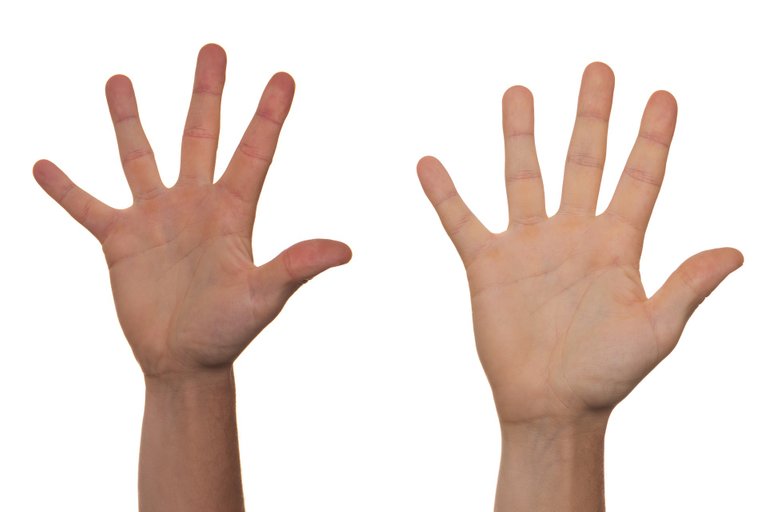A show of hands if you've ever had this ethical dilemma?
 Image by Niek Verlaan from Pixabay
Image by Niek Verlaan from Pixabay
You're entering a hospital, in a bit of a hurry and you are confronted with a hand sanitizer dispenser at the doorway. Do you use it?
It happened to me the other day, on my way to an administrative business appointment at one of Chiang Mai's leading hospitals. I was NOT going to be making any patient contact, nor going into patient areas. I had washed my hands already twice that morning and was freshly showered. Clearly the expectation is that every person coming into the hospital use the hand sanitizer. Only I didn't. Although I paused momentarily to think about it, and saw the reception staff observing me. In the ultimate of ironies, I was instructed to wait for my appointment and found myself literally in the middle of a hand sanitizer promotion extravaganza.

I observed with some interest. There was NO explanation of the how and why of hand sanitizer use, nor the application of logic that handbags and shoes carry far more bacteria into a hospital setting than your hands ever will.
The first nurse who offered me a convenient FREE single-use-plastic purse pack of hand sanitizer looked perplexed when I declined politely. But she didn't ask why I had declined, and backed quietly away from the strange foreigner. The second nurse DID ask (clearly they had been instructed to hit up all members of the public in the hospital) and so I politely explained. She blinked as I summarized really quickly why it's bad for your skin, bad for the environment and how it CAUSES more bacterial problems in future. And that surgeons don't use it, because they read and are well informed. She blinked again, poor girl. *Note to Self: less coffee helps soften the Dutch directness 'thing' which can be overwhelming to Thai people.
So the first and foremost reason to decline hand sanitizer is that there is CLEAR scientific research showing not only that it's less effective than simple handwashing, but also that it INCREASES bacterial transfer when used in conjunction with water. And yes, we DO wash that icky gel off our hands later with water, don't we?
Effect of soap and water compared with alcohol gel sanitizer. As shown in Figure 5, a 20-s wash with the non-medicated liquid soap and water was more effective at removing bacteria from palms than application of a gel sanitizer containing 70% alcohol (study E). Interestingly, use of both products in sequence resulted in more bacteria being transferred versus soap and water alone. This suggests that use of alcohol on the hands after washing them may increase transfer of bacteria that are normally sequestered. The finding that the combination of soap and water plus
alcohol enhances bacterial transfer has been reported in the literature previously by two independent investigators (8,11). The mechanism by which the combination of soap and water plus alcohol increases the numbers of bacteria that transfer from the hands is yet to be determined. It has been speculated that this combination raises bacteria from deeper layers of the skin (8, 11). Source
Why bother with the clear facts of science when you have the opportunity to sell lots of product - repeat purchase product - which is insanely cheap to make?
But I digress.
My other reasons for declining the hand sanitizer are very well researched, and publicly documented.
- Triclosan - a primary ingredient in almost all hand sanitizers - creates and contributes to bacterial resistance. Over time, excessive use of triclosan in a hospital setting will increase the rise of dangerous, life-threatening, resistent bacteria. "...widespread use of triclosan may represent a potential public health risk in regard to development of concomitant resistance to clinically important antimicrobials." Source
- The glycerin (another primary ingredient of almost all hand sanitizers) damages both the dermis and the subdermis of the skin, causing excessive dryness over time.
- The alcohol (another primary ingredient of almost all hand sanitizers) causes excessive dryness of the skin and skin damage.
- Damaged skin is less able to naturally repel bacteria and, in fact, will carry higher levels of bacteria who are able to multiply in the compromised dermis.
And then there are my ENVIRONMENTAL reasons for declining:
- All that bacterial resistance-causing triclosan eventually gets washed down a drain, into our waterways and into the sea, disrupting marine and aquatic life and, over time, contaminating ground water.
- Single use plastics? If they're really not needed, then don't.
- Glycerine is produced from fossil fuels which are in increasingly limited supply.
We need to QUESTION everything, even when so called health practitioners tell us it's important. There are so many agendas, and so much that can be done differently, without harming Mother Earth or our own natural health.
So why did I hesitate at the door? Because I DO understand the issues of dirty hands in hospital rooms, having spent far too much of my life laying in hospital beds. But creating easy, short-term so-called 'solutions' creates far bigger problems later on for those same health care providers.
I'd like to see ALL restaurants, hospitals, washrooms, public baby changing areas etc have soap and water hand-washing options with fresh, laundered, cloth towels. Yes, it costs. But the cost to ourselves, our collective health and Mother Earth are far greater taking these poorly thought-through courses of action.
So if you HAVE to use hand sanitizer (eg the cashiers at our local supermarket are REQUIRED to use it) for your work, what can you do?
- Use it as minimally as possible.
- Don;t touch those same chemically hands to baby's faces etc
- Try to inform your employer (yes, you can fwd this article to them).
- Take exceptional care of your skin to protect your hands overnight and repair the damage while you sleep.
I STARTED this hand-washing research journey because SO MANY CUSTOMERS present with over-dry, cracked and damaged hands. Our solution at Pure Thai Naturals Co Ltd has been to develop an Intensive Skin Repair Balm made from natural Thai beeswax, vetiver essential oil, moringa seed oil and pure vitamin E. Using an intensive repair product overnight is the best we can suggest to counteract the drying effects of the glycerin and the alcohol, if you HAVE to use hand sanitizer. Here's what my Chiang Mai customer had to say about it:
But the best choice by far is to politely decline the hand sanitizer and wash well with water, a nail brush and a pure natural soap for 20 seconds plus.
Please inform yourself, take care of your natural health and please STOP using products which harm our environment.
The post was originally published on my own blog, My Natural Thai Life - connecting you with all things natural in Thailand. Please come over and check out my blog and my online store - shipping worldwide with DHL and throughout Thailand with Kerry Express.






This is a very interesting article, it’s nice to see the topic of antimicrobials and resistances discussed more often. I 100% agree with a lot of the points you made, especially about the single use plastic waste in the purse pack hand sanitizers. There were a few things I wanted to point out however.
The article you linked to is excellent, although I noticed that it’s focusing primarily on the food industry and one of the first comments they make is about how a lot of evidence gathered on the effectiveness of alcohol as a disinfectant is tailored to the health industry, and so they wanted better evidence on their industry. For the food industry they’re right - hand washing is more effective than alcohol rubs. I’m guessing partly because of residues left on the hands from the food, but of course you don’t want to be then touching food with the residue from alcohol rubs.
Another thing to consider is what is actually used in hospitals. I realise this may vary a lot, so I can only speak for Australia and even then it could vary between hospitals. They generally use a 90% alcohol rub, which is capable of killing almost all bacteria and viruses other than rabies and possibly TB. 70% alcohol however can’t kill enveloped viruses (if I recall correctly, that includes influenza, HIV and the common cold virus).
Something I disagreed on was the statement about triclosan. I definitely don’t think it’s good, but it isn’t used in hand sanitizers with alcohol in (at least not here) because the whole purpose of triclosan is to be an alternative that’s used in alcohol free hand sanitizers. So while it is definitely not a good compound, as far as I know it is definitely not a primary ingredient in most sanitizers, just the alcohol free kind. Glycerin is used to offset the dryness from the alcohol and can indeed dry out the skin, but only in low humidity environments. This is because it is forming a protective barrier against the skin, so if your hands are already dry then it can end up drawing further moisture from the dermis. It’s kind of like how you can become “dependent” on cheap/bad lip balms. The environmental impact of glycerin is definitely another downside to it though.
Just recently in our labs we did an experiment on just this - the efficacy of hand washing vs. alcohol rubs. Our experiment showed very different results to the article linked, and I have a few theories why. The experiment was done with agar plates how samples of unwashed hands, and then several different combinations (1: hand washed, 2: alcohol rub, 3: handwashed then alcohol rub, 4: handwashed then handwashed, 5: alcohol rub then handwash, 6: alcohol rub then alcohol rub). Our obvious winner was 6, followed by 3, 2, 4 and then 1. One of the main things we had to consider was that hand washing almost always removes the outer layer of oil/protection on your skin, and potentially exposes more bacteria to others (your own skin flora) than to begin with. In the samples for number 1, all but one agar plate showed higher bacteria levels after handwashing than before. If you’re after a very thorough wash I’d be inclined to recommend treatment 3, as it would remove residues, and possibly compounds that the alcohol rub couldn’t kill. We also found that bacteria could be picked up from the hand drying source, and the soap bar (I see that you have mentioned liquid soap though, so this problem would be resolved).
I guess my point here though is that alcohol rubs (80% and above) are an amazing way to quickly disinfect already (mostly) clean hands. So no, not effective in the food industry and no, not effective for doctors and people working in hospitals. But for speed and cleanliness for visitors, I feel they’re very effective. Aside from the environmental downsides of glycerin, alcohol rubs are cheap to produce, extremely effective when around the 90% mark, and don’t promote antimicrobial resistance in any way (they are bactericidal, and kill bacteria which means the bacteria don’t have a chance to develop resistance. Ethyl alcohol uses a process known as “denaturation” wherein the cell membrane is effectively dissolved, along with the insides. Resistance occurs [generally] when the antimicrobial compound is only bacteriostatic, and just disables the bacteria). The problem arises with alcohol-free rubs and the triclosan in them, and thankfully they aren’t used in hospitals, at least over here :)
Thanks for such a detailed response. 😍
I guess the observation needs to be made that in Australia (where I grew up & lived for many years) the standard of labeling & ingredients in the sanitizers is (hopefully) more tightly controlled than Thailand. I say "hopefully" because of the illusion of control & standards. I export natural products into Oz now & it's one of the easiest countries and requires almost zero manufacturing or ingredient disclosure. Truly.
So much to consider. My biggest response is that while your particular alcohol rub might be effective, it's the repeated use of an environmentally damaging product that denatures & harms the skin which sets that particular individual repeat user up for future bacterial issues, as rough dry skin harbours more bacteria than healthy functioning skin.
In my natural products biz where hand sanitation issues are a daily thing, we (like the food industry) would never allow hand sanitizer due to contamination - same as we dont allow latex gloves due to powder contamination. If I wouldnt contaminate a product with that icky chemical residue, why would I contaminate my immune compromised grandma or a newborn baby by touching them?
I think you win Epic Comment of the Week. 💚
Sometime i wonder, why do they do so many artificial things when nature are so fantastic? Especially when the artificial products are poisoning the world...
Tough question & a very valid one. I guess we can only ever be diligent ourselves so that "we" don't become "they". Thanks for stopping by.
Thank you @artemislives! I knew I never liked the stuff, and avoid it, as much as possible. I did not know this:
Effect of soap and water compared with alcohol gel sanitizer. As shown in Figure 5, a 20-s wash with the non-medicated liquid soap and water was more effective at removing bacteria from palms than application of a gel sanitizer containing 70% alcohol (study E). Interestingly, use of both products in sequence resulted in more bacteria being transferred versus soap and water alone. This suggests that use of alcohol on the hands after washing them may increase transfer of bacteria that are normally sequestered.
That part is insane...literally. Thank you for sharing such important information.
It IS insane, especially when we see the horrendous bacterial resistance developing in the world.
I was faced with this issue when my sister was in the hospice,me and my family were told to use the hand sanitizer before entering the room, my children too. I never did and certainly did not want my girls too. I know what they contain and how damaging they are, thank you for sharing this and helping to promote awareness xxx
How awful to require the sacred process of dying to be tainted by that yucky chemical smell! I didn't even post about the dangerous endocrine-disrupting fragrance factor in some brands! So glad we have some smart moms out there, protecting their girls and their tender young skin.
Well done, @artemislives! It is important to bring voices of alert to products designed more to fill the pockets of companies behind the curtain, than by lending a real aid, economic and friendly to the environment and people. The fierce marketing behind a product makes it suspicious.
Greetings and a warm hug, my dear.
Yes, the intensity of the marketing is already a big red flag. Thank you for that HUGE FAT UPVOTE! LOL.
Greetings and a warm hugs back. x
Interestingly, this is something I've only just started discovering more about. My daughter has been learning about it and her essays have been on antibiotic resistance, so we've been having conversations on it. I think she'll be interested in reading this.
I was interested to discover that hand sanitisers are also completely ineffective against some viruses (due to a thicker fat coating which protects them, if I reminder correctly). The virus in question in the case I was reading about was influenza A and washing your hands under running water alone is more affective than using an alcohol sanitizer.
Posted using Partiko Android
Honestly, I could have written a book about this. Yes, there is so much research out there to show that hand sanitizers are NOT effective and yet we still have Big Pharma and so-called leading hospitals pedaling this stuff. We have not yet BEGUN to understand what we have done to the environment, as we continue to merrily wash these dangerous biocides into our waterways.
I'm glad your daughter is learning about this - just so glad.
It is a very complete article that goes beyond a simple anecdote of your visit to the hospital @artemislives, is informative and educational, hopefully in countries like mine could be informed of the damage that brings this kind of things to the environment, thank you for this excellent material, we thank you and send you a big hug.
Sadly I know in Venezuela this is now hypothetical, as most hospitals lack the most basic of supplies. I'm glad they can't afford this one. Big hugs back to you and the children.
Thanks for sharing:)
Welcome... & thanks for stopping by. 😊
Hate Glycerine. Hate tricolsan. Hate the misplaced neurosis and misinformation of modern medical practice.... Love you post.
We need to plug away at showing people the science of why glycerine appears to soften skin (whilst actually destroying it) and how triclosan is a bacterial and environmental nightmare that's just beginning. Thanks for stopping by and your support. Much appreciated.
When you put it like that, it sounds valid. Almost counterintuitive.
Really GOOD post @zen-fit - following you from Chiang Mai in Northern Thailand. More obesity related content please!!
working on my next article, stay tuned. hint: the best times to workout
Looking forward. 😊
I faced the same dilemma visiting Dad on cancer ward. I wasn't entirely convinced it would make a difference and I was looking at all these people walk in with shoes and bags and feet and arms and thinking - hang on, they aren't all sanitised, why is it just hands lol? And I'm clean - I washed my hands, I showered! And intuitively, I'm thinking - this stuff can't be good for you - I don't use it at work either though it's on every desk (I can see a bottle on my colleagues desk right now) - so it's good to read this and find out exactly why it isn't! I did have to laugh about your self note about coffee and forthrightness - you must be terrifying. Remind me when we meet NOT to take you out for a coffee .. he he xx
Promise we shall drink only fine red wine when you visit. LOL. Yes, I am aware of my shortcomings. :) It would be an interesting study to bloodtest people like teachers for blood triclosan levels, no?
Your post was so spot on. I always preached soap and water with the rubbing of the fingers in between , some hot water, you are good to go. I always taught my children to wash their hands often and before meals. Inspection was mama's job.
After working as an x-ray technologist for over 40 years in a hospital setting, I know the dangers, people need to be educated, leave that purse in the car. hehe😁👍❤
I actually never feel Im really HOME without a solid hand scrubbing session. 😊 In my natural products biz Im also super aware & supervising & training staff on it. Which makes the hospital experience all the more bewildering. 🤔
Good to know! And good on ya for declining!
Yes... is necessary to make a stand on all this 'little stuff' which adds up to be Very Big Stuff!!
Thanks for the very informative information. It's hard to believe that information of this nature is out there, and you can still find this product every where.
I had no idea of the many negative ramifications of using this product.
It IS hard to believe, isnt it? Appreciate you stopping by.
When I have to go into a hospital, I keep a small bottle of an essential oil blend that is supposed to ward off pathogens in my pocket. I have never had a problem, and folks comment about how good I smell. Whenever I leave the room to go into a public space I put a drop in my palm and breathe it in. I know it does much more good than the sanitizers do, and with fewer harmful effects.